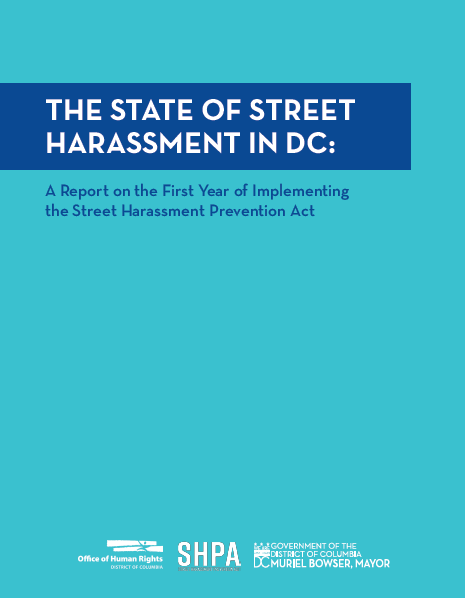Most individuals (69%) surveyed had experienced verbal street harassment in DC in the prior six months; 40% reported that they had experienced physical street harassment.
In April 2020, the District of Columbia Office of Human Rights (OHR), the agency that enforces the District’s anti-discrimination laws, released the first report on the progress of implementing the Street Harassment Prevention Act (SHPA) of 2017. SHPA was groundbreaking by creating the first legal definition of street harassment in the United States and by uniquely focusing on prevention through education instead of criminalization. The District’s approach to understanding and preventing street harassment is quickly becoming a model for the country.
While the passage and implementation of SHPA is unique to DC and makes the city a leader in this area, street harassment is not a problem that is unique to the District. In a 2019 national study, the UCSD Center on Gender Equity and Health and Stop Street Harassment found that 71% of women reported experiencing street harassment in their lifetime. As detailed in this SHPA report, the 2019 District-wide study found that 69% of individuals surveyed have experienced unwanted verbal street harassment and 40% experienced unwanted physical street harassment in DC in the six months prior to receiving the survey.
The SHPA Report provides recommendations in the following three areas:
- The report details recommended trainings and the specific audiences that should be mandated or highly encouraged to take the different types trainings;
- The report details a recommendation for a reporting portal to which victims and witnesses of street harassment could report incidences of street harassment for data collection;
- And, finally, the report provides templates for District agency policies on street harassment.
We are proud to share this important work and highlight the statistics and stories of individuals who experience harassment frequently. We appreciate the members of our Advisory Committee on Street Harassment who continue to strive to help their peers and community members to remain safe in the District. Thank for your support of our continued work to combat harassment and discrimination in the District.
Download the report:


